In this webinar we will discuss tax saving strategies for your practice, simple and complex tax planning opportunities.
Tax Saving Strategies Webinar
Tax Saving Tips For Dentists
The last few tax years saw many new changes in tax legislation. Planning ahead is more important than ever to ensure you work within the rules to not miss out on a tax saving opportunity. Tax for dentists is a complex area that requires specialist tax knowledge about dentistry. Our team has this specialist tax knowledge.
Action Point
Optimize tax benefits by strategically claiming capital allowances. If claiming full capital allowances would result in losing personal allowances due to high profits, elect to claim a reduced amount. This preserves personal allowances and carries forward unclaimed allowances to future years.
Click here to read our article about financial tips for dentists.


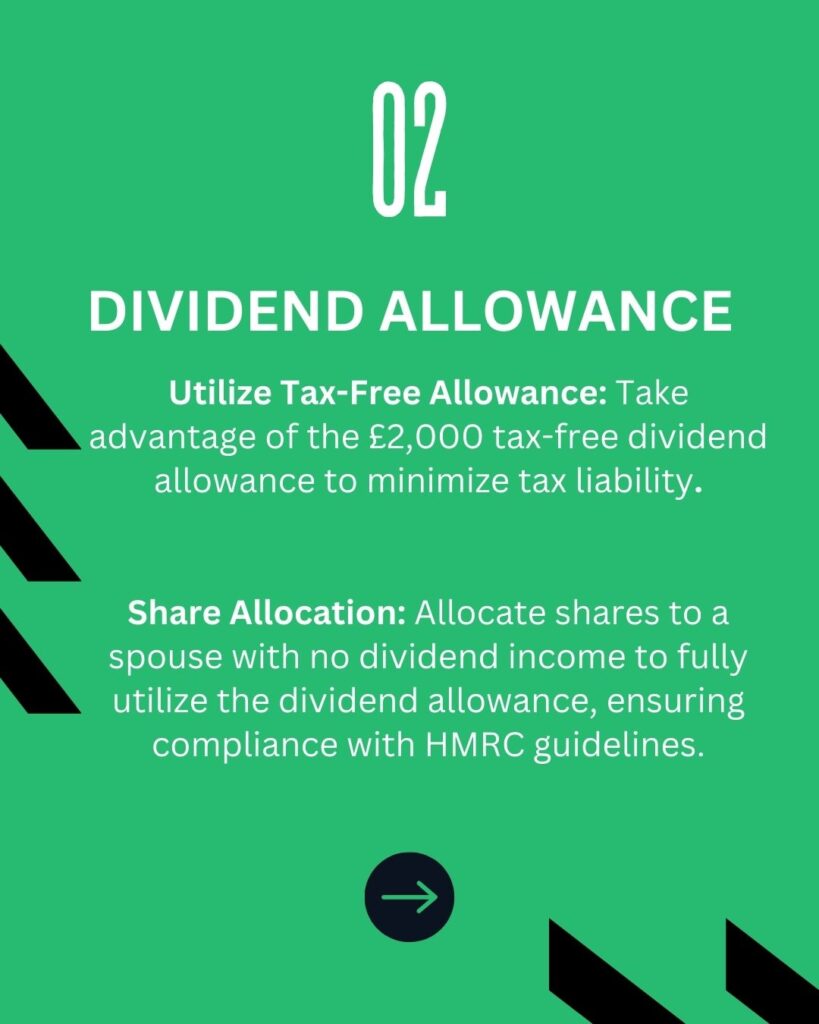
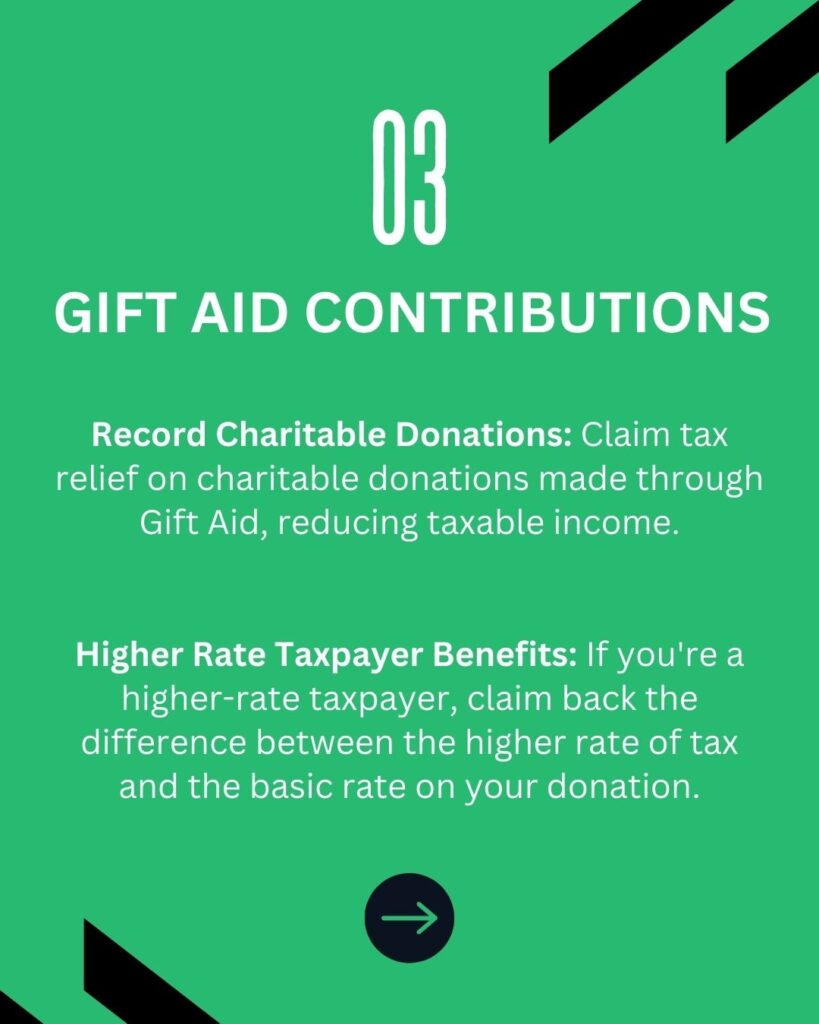
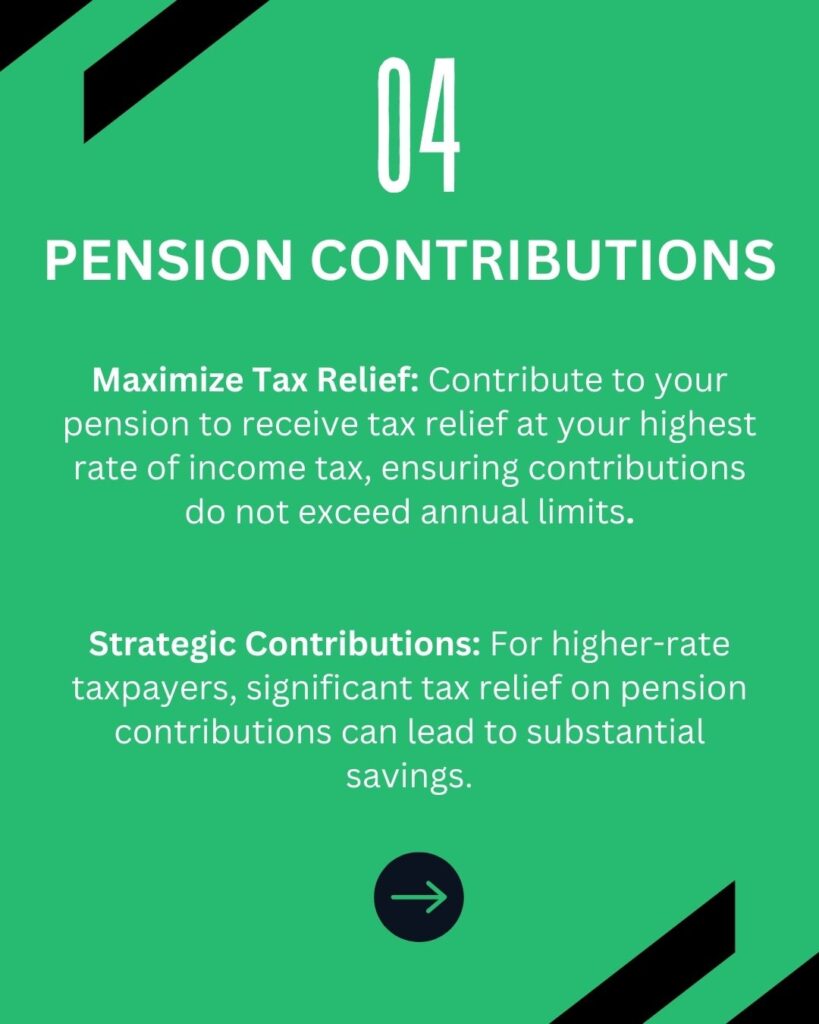
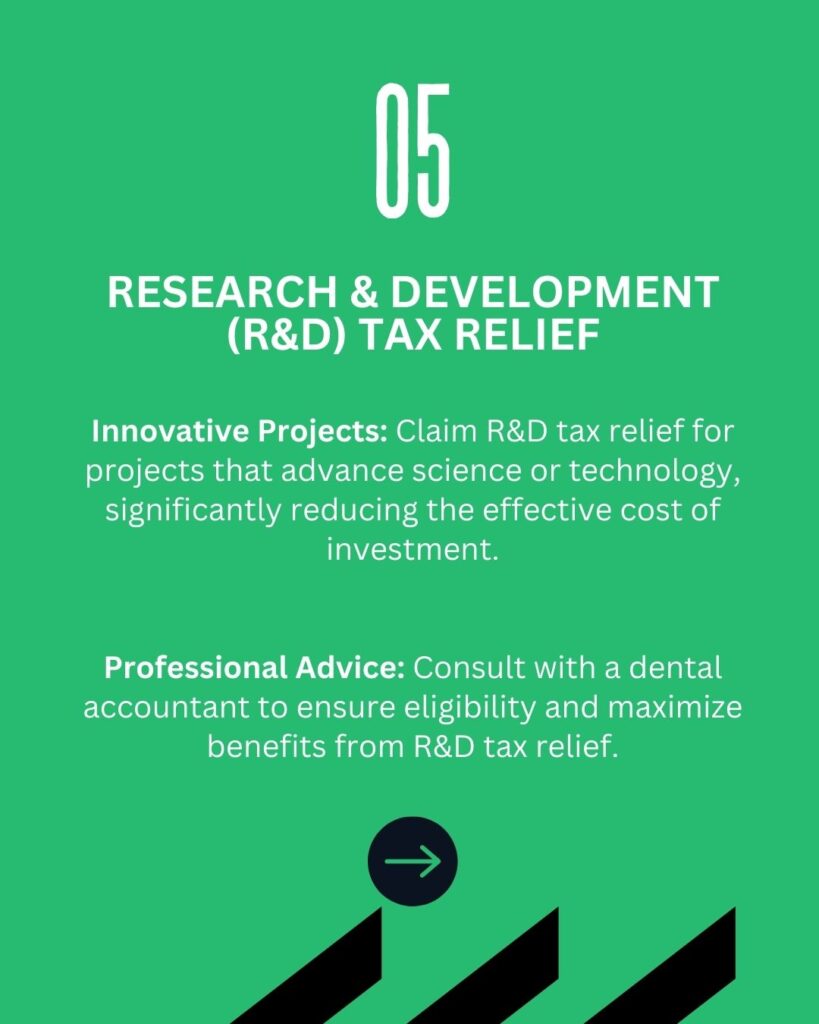
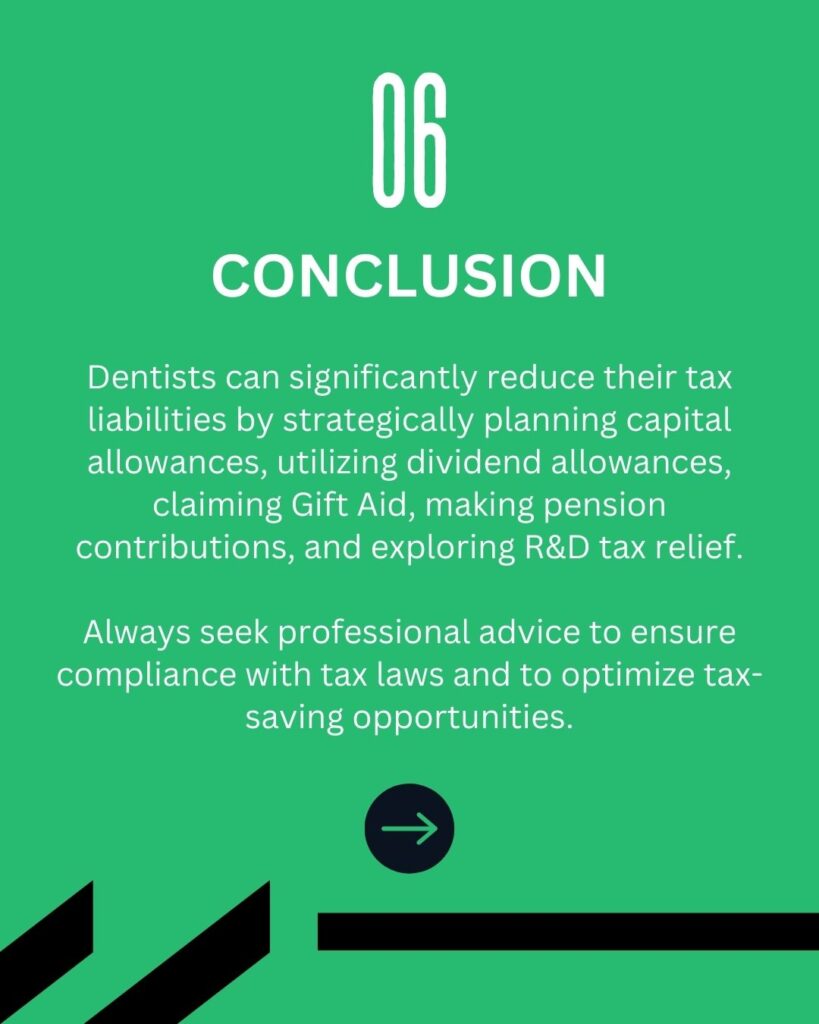

Selective Capital Allowances Planning
Even though you may have spent money on capital items in a tax year, there is no requirement to claim capital allowances at all.
This matters when your circumstances in a tax year mean that if you claimed all of the capital allowances you are eligible for, you would lose your personal allowance.
E.g. Dentist ABC has profits of £100k and losses of £50k brought forward which can be used to reduce the taxable profits.
They also spent £50k on capital items in the year, upon which capital allowances can be claimed. However, an election can be made to reduce the claim to £38.5k instead, leaving £11.5k as the taxable profits. (I.e. £100k -£50k -£38.5k = £11.5k).
By restricting the amount of capital allowances claimed you can still make use of your personal allowances (Which is £11,500 in 2017/18) and carry forward the unclaimed capital allowances into the next year instead of losing them.
Action Point
Strategically plan capital allowances to optimize personal allowance benefits. Consider electing to claim less than the total available to carry forward unclaimed allowances, maintaining personal allowance eligibility.
Click here to read our blog on 10 tax saving tips for Vets.
Dividend Allowance
With the new rates of dividends that came in on the 6th April 2021, dividend income is now taxed at 7.5%, 32.5% and 38.1%, depending on whether your total income (including the dividend itself) puts you into the basic rate, higher rate or top rate bracket.
Along with the new rates the Chancellor has now given every UK taxpayer a new £2,000 tax-free “dividend allowance” which means the first £2,000 of dividend income is tax-free. To minimise your tax position, it is possible to allocate some shares to a spouse who doesn’t have dividend income to make sure this dividend allowance isn’t lost. This must be done carefully and within the accepted boundaries to be acceptable to HMRC.
Action Point
Maximize tax efficiency by using the £2,000 tax-free dividend allowance. Allocate shares to a spouse with no dividend income to fully utilize this allowance. Ensure compliance with HMRC guidelines for share allocation.
Contact us to find out more
Gift Aid
Remember to record all the charity donations you’ve made. These reduce your taxable income.
If you’re a higher rate taxpayer, you can personally claim back tax.
Example: You donate £100 to charity, they claim Gift Aid to make your donation £125. You pay 40% tax so you can personally claim back £25.00 (£125 x 20%).
Care needs to be taken here though. It can sometimes cost you tax. If you’re close to the personal allowance, this could be the case. Speak to a dental accountant to check what tax you are due back!
Action Point
Maximize tax benefits by recording all charitable donations for tax reduction. Higher-rate taxpayers can reclaim tax on Gift Aid donations. Consult a dental accountant to optimize tax returns and avoid potential costs.
Pension Contributions
When paying into your pension, you receive tax relief on any contributions that you make. This is at the highest rate of income tax that you pay, provided that the total gross pension contributions paid into your pension scheme, by you and anyone else don’t exceed the lower of your annual earnings and the annual allowance.
This could mean that, if you’re a higher rate taxpayer, £10,000 worth of contributions could get you £4,000 tax relief. Meaning you’re receiving at least a £10,000 benefit for only £6,000.
Action Points
Maximize tax relief on pension contributions, especially for higher rate taxpayers, ensuring contributions do not exceed the lower of annual earnings or the annual allowance for optimum benefits.
Limited Company Research & Development
Are you doing something that has never been done before, in advance of current technologies and sciences? This could be something as simple as a website or an app.
Millions worth of tax relief is missed by SME’s, due to people not knowing about this extremely generous tax relief for qualifying expenditure.
For each £10,000 spent on R&D, you could receive £22,500 worth of corporation tax relief. That means that the expense only really cost you just over half of what you spent at £5,500.
The tax rules surrounding this are very complex and therefore require a professional dental accountant to ensure the expenses qualify.
Action Point
Leverage R&D tax relief for innovative projects, potentially receiving £22,500 in corporation tax relief for every £10,000 spent, effectively reducing the cost to £5,500. Seek professional advice to ensure eligibility and maximize benefits.
Click here to find out more about our R&D tax relief services.
Cash In On Self-Employment Profits Taxed Twice
Again, another relief people know little about.
If your self-employment year-end differs from 5th April, it’s very likely you’ve paid tax twice on your overlap profits and therefore with a little planning, you can get this back!
Many sole traders and businesses have a tax relief just waiting to be used and can ‘cash it in’ at any time they choose.
Utilise Your Tax-Free Personal Savings Allowance
Do you have a credit balance Director’s loan account (amount owing to you from your Ltd company)?
If so, you could be missing out on utilising your tax-free personal savings allowance.
Invest Wisely
There are huge tax breaks for investments in EIS / SEIS and VCT’s. To say they are generous is a huge understatement.
For example, you could invest £10,000 into an SEIS and get £5,000 immediate tax relief. What’s more, due to loss relief, even if your investment folds, your actual loss will only be £2,750. You can even carry back to the previous year.

Contact us to find out more
In addition, every individual has a £20,000 ISA allowance available each year, which is income and capital gains tax free, so if you are not utilising this tax saving wrapper, you should really consider this.
Again, the tax legislation surrounding these different investment schemes are complex and the level of relief depends on the individual person so you should ensure you obtain independent tax advice before proceeding.
Claim All The Allowances You Are Eligible For
Whether it is claiming for use of home as an office, or laundry allowance every little helps and working with a Dental Accountant means they will be able to maximise the items you can claim for.
Tax for dentists is a complicated subject which requires knowledge and expertise.
The above is just a taste of some of the top tips, however, we strongly recommend you seek professional advice on any of the subjects detailed above.
Action Point
- Review overlap profits for potential tax relief if your self-employment year-end differs from April 5th.
- Utilize your tax-free personal savings allowance, especially if you have a credit balance in your Director’s loan account.
- Consider investing in EIS/SEIS and VCTs for significant tax breaks and loss relief.
- Maximize your £20,000 ISA allowance annually for income and capital gains tax benefits.
- Claim all eligible allowances, including use of home as an office or laundry expenses, to reduce taxable income.
- Consult with a professional dental accountant to navigate complex tax rules and maximize your tax-saving opportunities.
Click here to read our articles Samera.
Our Expert Opinion
“I have had fewer hot meals than the amount of times dentists have asked me to save tax. The truth is the options available to save tax legitimately are limited. Long gone are the days of some questionable tax planning, however, there are reliefs and planning opportunities that are well with the law. Don’t get swayed by someone they can save you tax, instead focus on the basics right to save tax, this means accounting for everything, getting organised and ensuring you have the right tax structures set up for you.”

Dental Accounts & Tax Specialists
As dental practice owners ourselves, we know what makes a clinic tick. We have been working with dentists for over 20 years to help manage their accounts and tax.
Whether you’re a dental associate, run your own practice or own a dental group and are looking to save time, money and effort on your accounts and tax then we want to hear from you. Our digital platform takes the hassle and the paperwork out of accounts.
To find out more about how you can save time, money and effort on your accounts and tax when you automate your finances with Samera, book a free consultation with one of our accounting team today.
Dental Accounts & Tax: Further Information
Make sure you never miss any of our articles, webinars, videos or events by following us on Facebook, LinkedIn, YouTube and Instagram.



